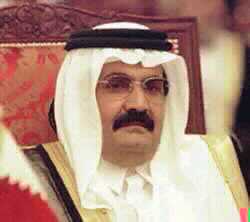Six Gulf Arab nations started a summit meeting in Qatar on Saturday amid fears of a U.S.-led attack on Iraq and rifts within their pro-Western alliance. Iraq shares borders with at least two members of the Gulf Cooperation Council (GCC) and any attack on Baghdad is likely to destabilize the whole oil-rich region. Addressing the opening session at the Doha Sheraton Saturday afternoon, the Emir of Qatar, SH. Hamad Ben Khalifa Al-Thani welcomed Iraq's acceptance of the UN security Council resolution and urged Baghdad to fully comply with all the requirements needed for it to avoid war and inflicting further suffering on the Iraqi people.
SH Hamad also stressed the role of the international community in preserving the Unity and territorial integrity of Iraq. The Emir also called on Iraq to implement all UN Security Council resolutions ensuring the independence of Kuwait, which Iraq invaded in 1990 triggering divisions both in the Arab and Islamic worlds up to this day.
All GCC members have publicly opposed a war but, aware that they powerless to sway their key ally the United States, the conference is expected to focus on the January 2003 implementation of a long-awaited Gulf customs union agreement.
Internal disagreements, especially a diplomatic spat between regional powerhouse Saudi Arabia and Qatar, have also cast a pall over the two-day annual meeting.
"Iraq is the main problem on the field but no decisions or stances will be taken which will have an affect on the situation," said Gulf analyst Moghazy al-Badrawy.
The GCC is a loose political, economic and military alliance grouping Saudi Arabia, the United Arab Emirates, Kuwait, Qatar, Bahrain and Oman.
The Iraq issue was also a factor in the diplomatic row which erupted between Saudi Arabia and Qatar earlier this year.
Analysts said that given the charged political atmosphere, the summit would kickstart the GCC customs union on January 1.
The GCC agreed last year to move forward the implementation of the customs union to 2003 from 2005. The accord calls for lower tariffs on foreign imports to five percent from 4-15 percent now and pave the way for a long-sought trade deal with the European Union -- the bloc's biggest trading partner.
A main dispute is over a six percent EU duty on primary aluminum Gulf exports. The GCC produces more than one million tonnes per year, about five percent of the world's total.
Gulf diplomats said the summit may also discuss a recent speech by Iraqi President Saddam Hussein apologizing for the 1990 invasion of Kuwait.
PHOTO CAPTION
The Emir of Qatar and Current Chairman of the 23RD. GCC Summit opened the end-year annual session in Doha, Saturday, Dec 21, 2002.
- Author:
& News Agencies - Section:
WORLD HEADLINES


 Home
Home Discover Islam
Discover Islam Quran Recitations
Quran Recitations Lectures
Lectures
 Fatwa
Fatwa Articles
Articles Fiqh
Fiqh E-Books
E-Books Boys & Girls
Boys & Girls  Hajj Rulings
Hajj Rulings Hajj Fatwas
Hajj Fatwas














